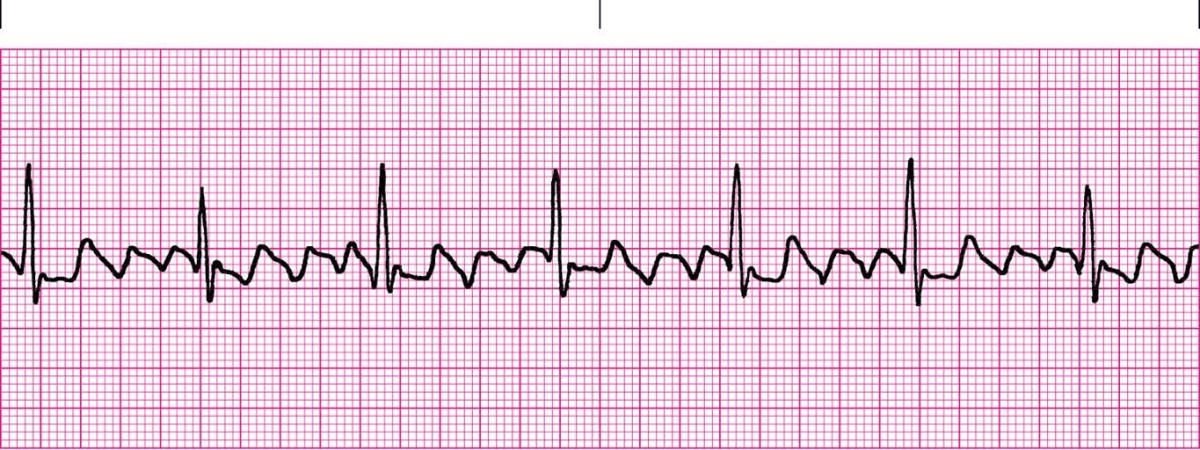This mean arterial pressure (MAP) goal is targeted in the ICU to maintain organ perfusion
> 65
This mode of ventilation allows the patient to breathe on their own but will deliver a set tidal volume
Assist Control
Synchronized Cardioversion is used for which type of patient?
Unstable Patient with a PULSE
Fentanyl
ICU patients should receive prophylaxis with SQ Heparin or Lovenox for this reason
Prevention of DVT/PE
This is the placement of a 5 lead ECG
White on Right Arm, Black on Left Arm, Green on Right Leg, Red on Left Leg, Brown in the Middle of chest equal to nipple line
(Salt & Pepper, Ketchup, Lettuce & Hamburger/Meat in the middle) :)
This lab value is a key indicator in mortality for septic patients
Lactic Acid
The volume of oxygen delivered by the ventilator is known as
FiO2
CAB is an acronym for
Circulation, Airway, Breathing
This medication is used to treat unstable SVT
Adenosine
This GI prophylactic therapy should be initiated in ICU
patients who are mechanically ventilated >48 hours
Stress Ulcer Prophylaxis (PPI)
A patient is noted to be in sinus tachycardia. What are 5 possible causes of this disorder?
caffeine | fever |pain | anxiety | hypovolemia
The Surviving Sepsis Campaign recommends at least this amount of IV fluid (mL/kg) be given as a bolus for fluid resuscitation in septic patients
30 mL/kg
This is the amount of Vt that should be delivered to prevent barotrauma and is part of the Lung Protective Strategy
tidal volume 4 - 6 ml/kg
This is the rate of chest compressions
30:2 or 100-120bpm
Magnesium Sulfate
Your patient's Stroke Volume is 75 mL/beat and his HR is 88. What is the patient's Cardiac Output (CO)?
6.6 L
What is the treatment for this rhythm if the patient is unstable?

atropine | transcutaneous pace
Antimicrobial agents should ideally be administered within this time frame (hours) after recognition of sepsis
1 hour
This type of noninvasive ventilation (NIV) may be utilized to provide extra support to a patient but requires the patient to breathe on their own
BiPap
This is the depth of chest compression
At least 2 inches
This medication should only administered AFTER sedation in the ICU and is used for vent synchrony
Paralytics- i.e. Succhinocholine, Vecuronium, Atracurium, Cisatracurium, Rocuronium, Mivacurium
3 Common sedatives used in ICU
Precedex | Propofol | Versed
A patient with this rhythm would likely experience what kind of signs/symptoms?
This patient would have no pulse and would be unresponsive.
Sepsis is associated with an increase or decrease in preload and afterload?
decrease in both preload (CVP) and afterload (SVR)
Name 5 nursing interventions to prevent ventilator associated pneumonia (VAP)
HOB > 30 |oral care at least q4h | suction prn | TQ2H | GI prophylaxis
Name 2 alternative routes of medication administration if IV access is unavailable
Intraossesous
Endotracheal
This medication may be used to treat heart failure and is a positive inotrope (oral agent & IV agent)
Digoxin-oral agent
Dobutamine- IV agent
Enteral nutrition should initiated in ICU patients within
12-24 hours
The nurse understands increased risks associated with a client being in the following rhythm. What signs and symptoms would alert the nurse to potential complications of this rhythm?
increased risk for stroke--> unilateral weakness, slurred speech, decreased responsiveness, etc
increased risk for PE--> tachycardia, CP, SOB
A nurse is caring for a client with sepsis and notes a CVP of 20. What signs and symptoms would the nurse expect to see?
CVP is too high--> we want CVP higher than normal, but this high could indicate we have overloaded the patient. volume overload s/s? SOB, crackles, edema
A patient is agitated and breathing over the ventilator. this would cause what type of alarm?
high pressure alarm
defibrillation
The nurse should be aware that MOAN- Morphine, Oxygen, ASA, Nitrates should be used cautiously in which type of patient? (3 answers)
Risk for Bleeding | BPH/Prostate Ca | ALOC
This is used for the hypothermic patient in the ICU
Bair Hugger/ Water Mat
A patient is noted to be in asystole and CPR is initiated. What is the initial drug of choice, frequency, and expected SE for a patient in this rhythm?
Epinephrine | Q3-5MINS
3 Most common antibiotics given for septic patients
Rocephin | Vancomycin | Zosyn
A nurse is caring for a patient on mechanical ventilation and notes a low pressure alarm. What should the nurse do first?
Check the connections from the vent to the patient
This is often given during code situations to reverse acidosis but is not part of the ACLS algorithm
sodium bicarbonate
This vasopressor is preferred in the Shock patient
Norepinephrine/ Levophed
A patient in the ICU is confused and pulling at lines. This may be caused by:
ICU Delirium
Identify the following rhythm: 
Second degree heart block type I/Wenckebach/Mobitz I